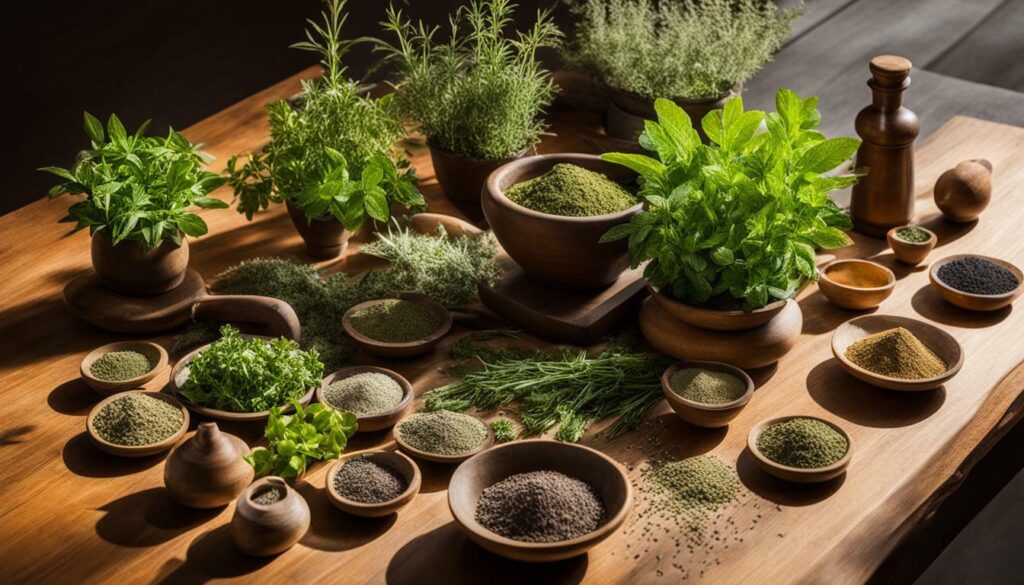
Traditional Chinese Medicine (TCM) is an ancient healing system that has been practiced for thousands of years. It encompasses various psychological and physical approaches, including acupuncture, tai chi, and the use of herbal products, to address health problems. TCM focuses on treating the whole person rather than just the symptoms, targeting the root cause of illness and promoting overall well-being.
Key Takeaways:
- TCM is an ancient healing system that has been practiced for thousands of years.
- TCM focuses on treating the whole person and promoting overall well-being.
- Acupuncture is a key technique in TCM that can stimulate natural painkillers in the body.
- Tai chi can improve balance and stability, reduce pain, and improve quality of life.
- Chinese herbal products have been used in TCM for various medical conditions, but more research is needed to determine their effectiveness.
- “Discover Holistic Healing with Traditional Chinese Medicine” is a book that explains TCM principles and provides practical methods to implement TCM at home.
- Online courses are available for those interested in learning more about TCM principles and practices.
The Power of Acupuncture in Traditional Chinese Medicine
One of the key techniques in Traditional Chinese Medicine (TCM) is acupuncture, which involves stimulating specific points on the body by inserting thin needles through the skin. This ancient practice has been used effectively for thousands of years to treat a variety of physical and psychological conditions.
Studies have shown that acupuncture can stimulate the release of natural painkillers in the body and affect the areas of the brain responsible for processing pain. However, some trials have indicated that real acupuncture and sham acupuncture (where needles are inserted at non-specific points) are equally effective, suggesting a placebo effect. Nevertheless, research suggests that real acupuncture may be beneficial for chronic pain conditions such as low-back pain, neck pain, osteoarthritis/knee pain, and carpal tunnel syndrome. It may also help reduce the frequency of tension headaches and prevent migraines. It is important to note that acupuncture should always be performed by a trained and licensed practitioner.
Acupuncture is a natural remedy for health and wellness that can work in conjunction with other TCM practices and Western medicine. By promoting the body’s natural healing processes, acupuncture can help address physical and emotional imbalances, promoting overall well-being.

When you visit a licensed acupuncturist, they will discuss your symptoms and create a customized treatment plan that may include acupuncture, acupressure, herbal products, massage, and other TCM practices. The acupuncturist will typically insert thin, sterile needles into specific points on the body, which may cause a brief sensation of discomfort. The needles are usually left in place for 15-30 minutes while the person relaxes.
Overall, acupuncture can be a safe and effective treatment for a variety of conditions, particularly chronic pain. By working with a licensed acupuncturist, individuals can experience the benefits of this natural remedy for health and wellness.
Harnessing Balance with Tai Chi in Traditional Chinese Medicine
Tai chi is another practice within TCM that combines gentle movements, mental focus, breathing, and relaxation. Research has shown that practicing tai chi can improve balance and stability in older people and those with Parkinson’s disease. It can also reduce pain associated with knee osteoarthritis, help manage fibromyalgia and back pain, and improve quality of life and mood in individuals with heart failure. Tai chi is a low-impact exercise that can be easily adapted to different fitness levels and can be practiced by people of all ages.

Tai chi has been used in China for centuries as an alternative healing practice. It is believed to have originated as a martial art, but over time, it has evolved into a form of meditation and exercise for health and relaxation. Tai chi involves performing a series of slow, flowing movements, accompanied by deep breathing and a focused mind.
The benefits of tai chi are not just physical; it also promotes mental and emotional well-being. It can reduce stress and anxiety, improve sleep quality, and enhance cognitive function. Tai chi can also increase self-awareness and mindfulness, allowing individuals to become more in tune with their bodies and emotions.
Exploring Chinese Herbal Medicine in Traditional Chinese Medicine
Chinese herbal products have also been widely used in TCM for various medical conditions. The use of herbal products is one of the fundamental techniques in TCM, and practitioners use various combinations of herbs to support the body’s natural healing process. The herbs can be taken internally or applied externally.
The use of Chinese herb products has been studied for a variety of health issues, including stroke, heart disease, respiratory diseases, and mental disorders. While some studies have shown promising results, more research is needed to determine the effectiveness of these products, and it is important to note that not all herbal products are safe for everyone to use.
It is essential to consult with a qualified TCM practitioner or healthcare provider before using any herbal products. They can help you choose the right herbs, help you navigate the potential risks and side effects, and ensure that the herbs you are using are of high quality and safe for your particular needs.

TCM practitioners may prescribe a combination of herbs, and this is known as a formula. These formulas are carefully tailored to meet the individual needs of the patient and to address the root cause of their health concerns. The formulas can be made up of anywhere from two to twenty different herbs.
Herbs commonly used in TCM include ginseng, ginger, licorice root, and goji berries. Each herb has its unique properties and can be used to address different health issues.
It is important to note that while Chinese herbs are widely used in TCM and can be helpful for some people, they should not be used as a substitute for conventional medicine. It is always important to seek the advice of a qualified healthcare professional before starting any new treatment, including TCM and herbal products.
Integrating Eastern and Western Medicine for Holistic Health
Integrating Eastern and Western medicine can offer a more comprehensive approach to holistic health and well-being. Traditional Chinese Medicine (TCM) is an ancient healing system that addresses health problems by treating the whole person and promoting overall well-being. TCM has been shown to be effective in managing pain, reducing stress, and improving quality of life. When combined with Western medicine, TCM can provide a more holistic and personalized approach to healthcare.
TCM techniques such as acupuncture, tai chi, and the use of herbal products can complement Western medicine’s use of drugs and surgery. For example, acupuncture can be used together with medication to manage chronic pain conditions, while tai chi can be used to improve balance in older adults alongside physical therapy. Chinese herbal products can be used in conjunction with Western medications to support the body’s natural healing processes.
Integrating Eastern and Western medicine can also help individuals take a more active role in their healthcare. By combining the expertise of both Western and TCM practitioners, individuals can benefit from a more personalized approach to their healthcare, addressing all aspects of their well-being. This can lead to better health outcomes and improved quality of life.
It is important to note that individuals should always consult with their healthcare provider before integrating TCM practices into their healthcare regimen. A qualified TCM practitioner can work collaboratively with a Western healthcare provider to develop a comprehensive and effective treatment plan.
By integrating Eastern and Western medicine, individuals can experience the benefits of a more comprehensive and personalized approach to holistic health and well-being.

Practical Methods for Implementing Traditional Chinese Medicine at Home
By implementing practical methods from TCM into your daily life, you can promote balance and overall well-being. Here are some tips for incorporating TCM practices:
- Eat a balanced diet: In TCM, food is considered medicine. Incorporate a variety of whole foods, including fruits, vegetables, whole grains, and lean proteins, into your diet. Avoid processed foods, excess sugar, and caffeine.
- Stay active: Exercise is essential for maintaining physical and mental health. Incorporate gentle movements such as tai chi or qigong into your daily routine. Take a walk or practice yoga.
- Manage stress: Stress can have negative effects on the body and mind. Incorporate relaxation techniques such as meditation, deep breathing, or acupuncture to help manage stress levels.
- Get plenty of rest: Getting enough sleep is important for overall health. Aim for 7-9 hours of quality sleep each night.
- Consult a TCM practitioner: A qualified TCM practitioner can help you determine which TCM practices or herbal products are right for your individual needs.
By incorporating these practices into your daily life, you can promote balance and well-being, and tap into the healing potential of TCM.

Exploring the Holistic Healing Benefits of Traditional Chinese Medicine
Traditional Chinese Medicine offers a holistic approach to healing, focusing on treating the whole person and addressing the root cause of illness. This ancient healing system encompasses various psychological and physical approaches to promote balance and well-being, including acupuncture, tai chi, and the use of herbal products.
Acupuncture, one of the key techniques in TCM, has shown promising results in managing pain and improving overall well-being. Studies indicate that real acupuncture may be beneficial for chronic pain conditions such as low-back pain, neck pain, osteoarthritis/knee pain, and carpal tunnel syndrome. Tai chi, another practice within TCM, combines gentle movements, mental focus, breathing, and relaxation to improve balance and stability, reduce pain, and improve quality of life.
Chinese herbal products have also been widely used in TCM for various medical conditions. While more research is needed to determine their effectiveness, they have shown potential for stroke, heart disease, mental disorders, and respiratory diseases such as bronchitis and the common cold. It is important to consult with a qualified TCM practitioner or healthcare provider before using any herbal products.
The book “Discover Holistic Healing with Traditional Chinese Medicine” by Dr. Lily Choi provides practical methods for implementing TCM at home, including natural modalities such as acupressure, herbalism, and meditation, along with lifestyle changes, to address a wide range of conditions. The book also delves into TCM concepts such as Qi (life force) and the balance of Yin and Yang within the body, promoting a deeper connection with one’s body, mind, and spirit.
For those interested in learning more about TCM, there are online courses available that provide an introduction to the principles and practices of Chinese medicine. These courses cover topics such as musculoskeletal structures, channel theory, anatomy, and Chinese remedial massage (tui na) skills. Students can earn Continuing Professional Education (CPE) points by successfully completing these courses, which can contribute to their professional development.
By understanding the principles and practices of TCM, individuals can take control of their health and find lasting relief through natural and holistic methods. Alternative healing practices such as TCM have gained popularity as people seek to promote balance and well-being in their lives.

Explore the holistic healing benefits of Traditional Chinese Medicine and discover a healthier, more balanced life today.
“Discover Holistic Healing with Traditional Chinese Medicine” – Book Review
In the book “Discover Holistic Healing with Traditional Chinese Medicine,” Dr. Lily Choi, a leading voice in TCM, explains how this ancient practice works and provides practical methods to implement TCM at home. The book covers a wide range of conditions, including headaches, migraines, hair loss, insomnia, infertility, constipation, anxiety, arthritis, tinnitus, and more.
Dr. Lily prescribes natural modalities such as acupressure, herbalism, and meditation, along with lifestyle changes, to address each specific ailment. The book also delves into TCM concepts such as Qi (life force) and the balance of Yin and Yang within the body, promoting a deeper connection with one’s body, mind, and spirit.
“Discover Holistic Healing with Traditional Chinese Medicine” is an essential read for anyone interested in TCM or seeking a holistic approach to health and well-being. Through the book, readers can gain a better understanding of TCM principles and practices and learn practical methods to implement TCM into their daily lives.

Overall, “Discover Holistic Healing with Traditional Chinese Medicine” is a valuable resource for anyone interested in TCM and its practices.
Online Courses for Learning Traditional Chinese Medicine
For those interested in learning more about TCM, there are online courses available that provide an introduction to the principles and practices of Chinese medicine. These courses offer an in-depth understanding of ancient healing techniques and their applications in modern-day health care.
The online courses cover a range of topics, including the fundamental concepts of TCM, such as Yin and Yang, Five Element Theory, Qi and Blood. Additionally, they provide an overview of various techniques such as acupuncture, acupressure, herbalism, Chinese Remedial Massage (Tui Na), and meditation.
The courses are designed to provide a comprehensive understanding of TCM and are suitable for healthcare professionals, students, and anyone interested in natural and holistic methods of healthcare. Successful completion of these courses can earn Continuing Professional Education (CPE) points, which can contribute to professional development.
Overall, online courses are an excellent way to learn about TCM practices and gain insights into the principles of promoting balance and well-being.

It is essential to choose courses from reputable providers to ensure the quality of the content and avoid misinformation. Some of the trusted providers of TCM courses include Pacific College of Health and Science, the Institute of Traditional Medicine, and the International College of Traditional Chinese Medicine.
Learning about TCM is an excellent way to understand natural remedies for health and wellness. By incorporating ancient healing techniques in daily life, we can promote balance and well-being and find lasting relief.
Conclusion
In conclusion, Traditional Chinese Medicine offers a holistic approach to healing, focusing on treating the whole person and addressing the root cause of illness. By understanding the principles and practices of TCM, individuals can take control of their health and find lasting relief through natural and holistic methods. Techniques such as acupuncture and tai chi have shown promising results in managing pain and improving overall well-being, while Chinese herbal products have been widely used but require more research to determine their effectiveness. The book “Discover Holistic Healing with Traditional Chinese Medicine” by Dr. Lily Choi provides practical methods to implement TCM at home for a wide range of conditions. For those interested in learning more, online courses are available that provide a comprehensive introduction to the principles and practices of Chinese medicine.
Additional Resources and References
For additional resources and references on holistic healing and traditional Chinese medicine practices, refer to the following sources:
- National Center for Complementary and Integrative Health (NCCIH) – The NCCIH provides comprehensive information on TCM principles and practices, including acupuncture, tai chi, and herbal medicine.
- Journal of Traditional and Complementary Medicine – This peer-reviewed journal provides research on various TCM practices, including acupuncture, herbal medicine, and tui na massage.
- Acupuncture Today – This publication provides news and articles on TCM practices, including acupuncture, herbal medicine, and nutrition.
- Tai Chi for Health Institute – This organization offers certified Tai Chi workshops and online courses for beginners and healthcare professionals.
- TCM Events – This organization offers seminars, lectures, and online courses on TCM practices and principles.
By exploring these resources, individuals can gain a deeper understanding of TCM and its potential benefits for holistic healing.
FAQ
Q: What is Traditional Chinese Medicine (TCM)?
A: Traditional Chinese Medicine is an ancient healing system that encompasses various psychological and physical approaches, including acupuncture, tai chi, and herbal products, to address health problems. It focuses on treating the whole person and promoting overall well-being.
Q: What is acupuncture and how does it work?
A: Acupuncture is a key technique in TCM that involves stimulating specific points on the body by inserting thin needles through the skin. It can stimulate the release of natural painkillers in the body and affect the areas of the brain responsible for processing pain.
Q: Is acupuncture effective for pain management?
A: Research suggests that acupuncture may be beneficial for chronic pain conditions such as low-back pain, neck pain, osteoarthritis/knee pain, and carpal tunnel syndrome. It may also help reduce the frequency of tension headaches and prevent migraines.
Q: What is tai chi and what are its benefits?
A: Tai chi is a practice within TCM that combines gentle movements, mental focus, breathing, and relaxation. It can improve balance and stability in older people and those with Parkinson’s disease, reduce pain associated with knee osteoarthritis, and improve quality of life and mood in individuals with heart failure.
Q: Are Chinese herbal products effective?
A: Chinese herbal products have been widely used in TCM for various medical conditions. However, due to the varying quality of studies, no firm conclusions can be made about their effectiveness. It is important to consult with a qualified TCM practitioner or healthcare provider before using any herbal products.
Q: How can I implement Traditional Chinese Medicine at home?
A: Practical methods for implementing TCM at home include acupressure, herbalism, meditation, and lifestyle changes. These methods can be used to address specific ailments and promote balance and well-being.
Q: What is the book “Discover Holistic Healing with Traditional Chinese Medicine” about?
A: “Discover Holistic Healing with Traditional Chinese Medicine” is a book by Dr. Lily Choi, a leading voice in TCM. It explains how TCM works and provides practical methods to implement TCM at home. The book covers a wide range of conditions and promotes a deeper connection with the body, mind, and spirit.
Q: Are there online courses available to learn about TCM?
A: Yes, there are online courses available that provide an introduction to the principles and practices of TCM. These courses cover topics such as musculoskeletal structures, channel theory, anatomy, and Chinese remedial massage skills. Students can earn Continuing Professional Education points by completing these courses.
Q: How can Traditional Chinese Medicine contribute to holistic health?
A: Traditional Chinese Medicine offers a holistic approach to healing by treating the whole person and addressing the root cause of illness. It can promote balance and well-being in both physical and psychological aspects, leading to a healthier and more balanced life.
Q: Where can I find additional resources and references about Traditional Chinese Medicine?
A: Additional resources and references about Traditional Chinese Medicine can be found in books, articles, and reputable websites such as the National Center for Complementary and Integrative Health (NCCIH).



